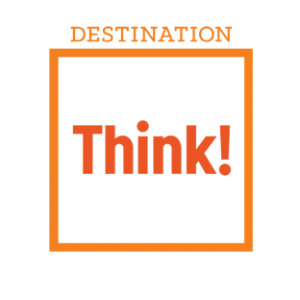March 2010
The Archives
-
Internet, social media
Facebook down for a week!
03.18.10 | Permalink | 4 CommentsGot your attention didn’t it?
This is purely a hypothetical scenario. It’s also an experiment in dual-blogging (think bloggers meet dual-pianists in Vegas). Rodney Payne from Think! and I are going to be hypothesising about the effects of Facebook shutting down for a week. Instead of commenting on each other’s blogs, we’re going to be posting each other’s responses as a blog.
[WB] Day 1. The Facebook URL stops responding. First thing that happens is an insane amount of activity on Twitter reporting the news. After that all hell breaks loose in the tech blogosphere; Mashable, Inside Facebook, All Facebook, Techcrunch, Techmeme et all just go crazy over the news. Traditional media follows a few hours behind.
[RP] Day 2. Facebook led last night’s evening news and is splashed across the front page of newspapers worldwide. Twitter traffic has more-than-doubled overnight with almost every tweet referencing #Facebook. Tweets have largely replaced status updates. New account registrations have grown significantly. The ‘Twitter Whale’ is displayed frequently to show that Twitter is slow and overwhelmed with traffic. Cell-phone carriers and email providers see a noticeable increase in messages. Blogs are filled with stories guessing at what’s going on.
[WB] Day 3. Everybody who threw a party and used Facebook Events to organize the party is ticketed off because nobody showed up. The first “Life without Facebook” t-shirts are starting to appear. ‘Experts’ on the news networks make suggestions about how to deal with Facebook detox. Facebook is scheduling a new conference for the next day.
[RP] Day 4. People realize that life A.F. (after Facebook) isn’t too scary. Facebook isn’t a matter of life-and-death like internet banking or email. It’s just a convenient social tool. Productivity at offices has surprisingly decreased slightly because many people can’t focus on one task without some distraction. Employees who had learned to collaborate using Facebook messages and Facebook chat are now forced to return to slower methods of communication.
[WB] Day 5. Facebook promises the network will be back up soon. Some businesses complain drops in sales because of a reliance on Fanpages and Facebook ads. Legal action is discussed. Flickr reports an increase in new accounts and uploaded photos. Some kids fear their Farmville animals will die.
[RP] Day 6. You would have thought that with 450 million people addicted to social networking and gaming that a rival-site would rise to meteoric success. However, MySpace hasn’t seen too much of a bump in traffic, commentators think its because of the lack of privacy built into people’s social graph. People who log in to their old accounts find a social wasteland with no posts from legitimate friends and just a scattering of links leading to creepy websites. People are beginning to think that Facebook may never come back online. Google Buzz and Orkut are getting an increased trickle of new users but its just not the same, all of our photos and friends were on Facebook.
[WB] Day 7. Media has nothing left to talk about and tech bloggers are too busy with the latest Apple iSomething. People stop caring about it. Life goes on without Facebook although they wonder what their friends are up to. Facebook announces service will be restored tomorrow and blames a proprietary Microsoft product for causing the crash of it’s service.
[RP] Day 8. The reckoning is upon us. Zuckerberg flicks the switch and issues a press release to that affect which is picked up by every single news organization in the world. Facebook blows past its previous 30% of web traffic to attract over 50% of internet users. Facebook’s servers overload and go down for another hour or two. When they come back online, people connect again, pay-per-click ads resume, and Farmville animals are revived just in time… Life goes on.
-
Internet
Must see presentations #4: Blaise Aguera y Arcas: Bing’s augmented-reality maps
03.16.10 | Permalink | 3 CommentsI saw Blaise’s first Photosync presentation at Web 2.0 in 2006 and was utterly impressed. He’s now working on Bing maps. This explains why Bing Maps is getting better and better and better.
His presentation at TED recently is a must see.It shows how Bing (and Google) Maps have become so much more than simple mapping tools. And the innovation will continue relentlessly. Let your imagination go wild after watching this presentation. What will Google and/or Bing Maps look like 5 years from now?
-
Uncategorized
Great example of fan engagement
I noticed the following post from the New Zealand fanpage on my news feed just now:

Simple, effective, engaging… 200 comments in 27 minutes (and going up fast still).
Great work NZ.
-
Internet, Marketing, Travel & Tourism
Small DMO’s, Facebook is more important than your website
03.05.10 | Permalink | 7 CommentsWhen I was meeting with the online directors of European DMO’s, we all agreed none of us will have a website 10 years from now. Why wait? Smaller city or community DMO’s often run great websites with very little traffic. Small budgets and a lack of expertise makes website maintenance, content management and online marketing a challenge.
These DMO’s should open up shop within Facebook instead. Facebook has 400M users and is still growing. Your consumers are effectively all on Facebook. Go where your consumers are, by creating a Fanpage:
- It allows you to do pretty much anything you do with your own website from a content perspective. And it comes with build-in apps for things like blogs, photo galleries, events calendar and more.
- You can engage consumers by allowing them to like, post and comment on your content and engage in other ways.
- Once somebody becomes a fan of your page, you can market to that person in a way that’s better than email marketing.
- Anything you post shows up on your fan’s newsfeed, potentially triggering a repeat visit. It can also be read by your fans friends, this can lead to a new visitor
- Any engagement on your fanpage by your fans will be displayed on your fan’s friends newsfeed, also a potential for new visitors to your fanpage
- You can run promotions and sweepstakes within Facebook (although this is getting more difficult)
- A fanpage can be indexed by Google, you can still get organic search engine traffic to your page
- Facebook gives you great analytics and insights about your Fanpage and fanbase
- Facebook allows you to laserpoint your advertising on Facebook; allowing you to cost effectively find your target audience
Most of the above is free.
As a small DMO, should you shut your website down tomorrow? No, but you you start taking your Facebook Fanpage seriously and start using it strategically today and it could be your primary channel sooner than you think.
-
Management, Marketing, tourism bc
Tourism BC 2010 Online Olympics activities: #12 – Battlestar Olympia
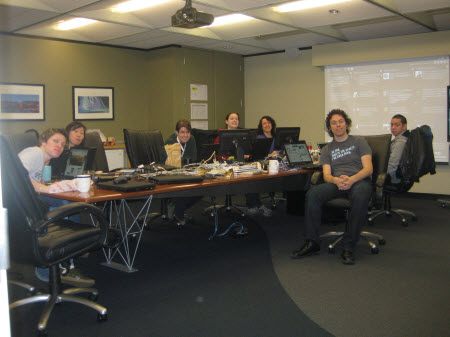
Tourism BC’s online team: Sarah, Jeanine, Holly, Karen, Mikala, William, Jose (on a PPC mission at the time: Dima)The traffic on our websites during the games was significant enough to have a day-to-day look at our tactics and adjust where necesary. What’s media talking about? What are people talking about in social media? Is there a cool story we can leverage through content? Is there something unexpected? Should we send a Field Reporter? Do we make adjustments to our PPC campaigns? Daily huddles and conference calls with our online partners allow us to quickly change plans.
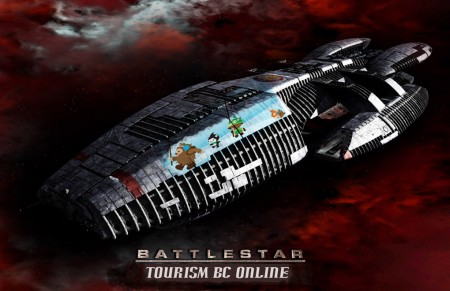
We turned one of our boardrooms into a command centre for the occassion: the Battlestar. Watching the games on a big screen and real time Tweets. Because we’re geeks after all.
This is also my opportunity to thank everybody on the online team, other Tourism BC teams and our partners who were instrumental in making the best use of this Olympic opportunity!
-
Internet, Marketing, tourism bc
Tourism BC 2010 Online Olympics activities: #11 – Social Media
An event like the Olympics makes all media, including social media, light up like a Christmas Tree. Everybody’s talking about it, and that’s exactly what we want. Instead of adding to the noise, our strategy for social media during the games focussed on supporting and encouraging key influencers while leveraging our own network.
Listening
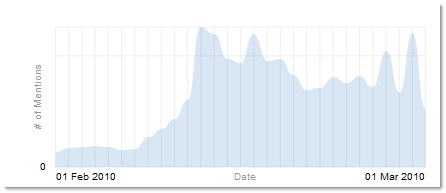
Tourism in BC related social media volume during February
Social media is the largest focus group out there so we treat it as a huge research opportunity. Data has been collected and will be analyzed. We’ve also used our monitoring tools to provide insights to our media, SEM Field Reporters and content teams. This enabled us to quickly respond to unexpected stories.
After the games, we can look at the data to identify what resonated about Vancouver and BC as a destination, potential new markets or product opportunities and key influencers in social media for future engagement.
Assisting and encouraging key influencers
Working with key influencers is a lot like working with travel media professionals (with a twist) especially since many traditional travel media have their own blogs. But there are also pure social media influencers, including local bloggers, athlete tweeters, etc. Jose from our online team has been working closely with our Travel Media team to coordinate efforts.
Building our community

We used the pre-Olympics to experiment with running contests on Twitter. We managed to more than triple our number of followers by giving away some Olympic tickets. We were wondering if people would leave right after, but they didn’t and instead are engaging with Karen, our tweeter extraordinaire, and re-tweeting our messages to their networks.
As an added bonus, our contest winners have been tweeting and blogging about their experiences and traveled around with our Field Reporters.
Engaging our community

Facebook fans and Twitter followers are a diverse group of BC residents, past visitors, tourism industry stakeholders and people who would like to visit. During the games, we tweeted information about the games, general trip ideas based on what was being talked about and re-tweeted messages from others. URLS’s were being tracked and during the games period, drove almost 50,000 visitors to our website.
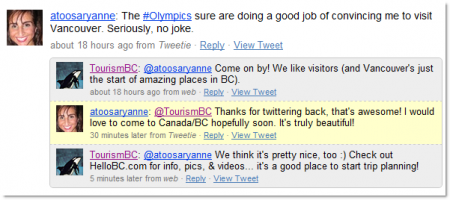
Karen set up searches in Tweetdeck to filter people who expressed an interest in visiting and started the conversation to make the trip a reality leading to wonderful conversations, new followers and hopefully visitors soon.
Lifepoints campaign
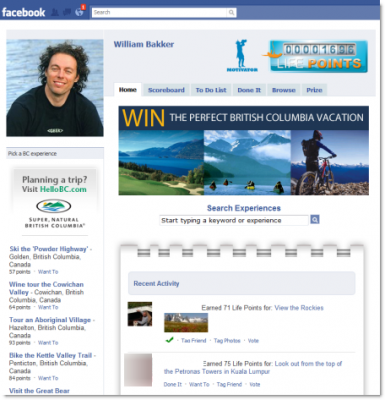
Lifepoints is a Facebook application where you get points for your life experiences. Points are based on how people have rated each experience. Compete with your friends for who gets the most out of life and create your own bucketlist by ‘wanting’ things. A natural fit with tourism so we’re running a campaign with Lifepoints to highlight some of the great experiences British Columbia has to offer and promote our contest.
Field Reporters
And of course we wanted to capture the excitement of the games through our Field Reporters. They’ve been all over town, and the rest of the province, to capture the Olympic vibe, the reactions from spectators, athletes and celebrities, against the backdrop of the destination.

